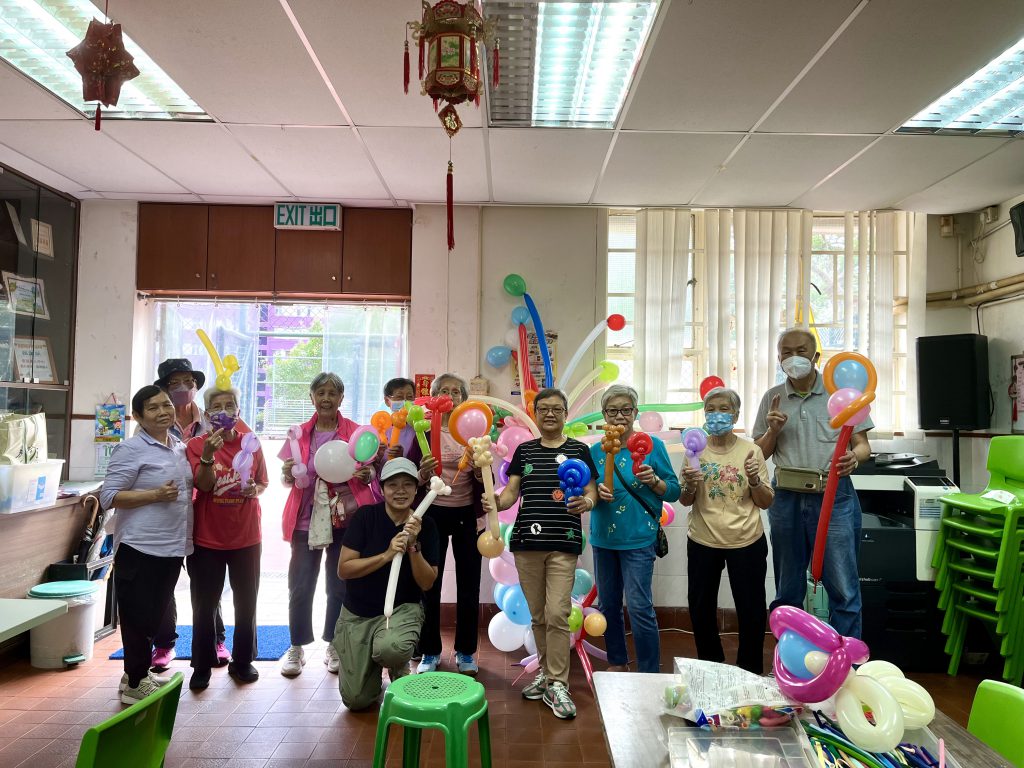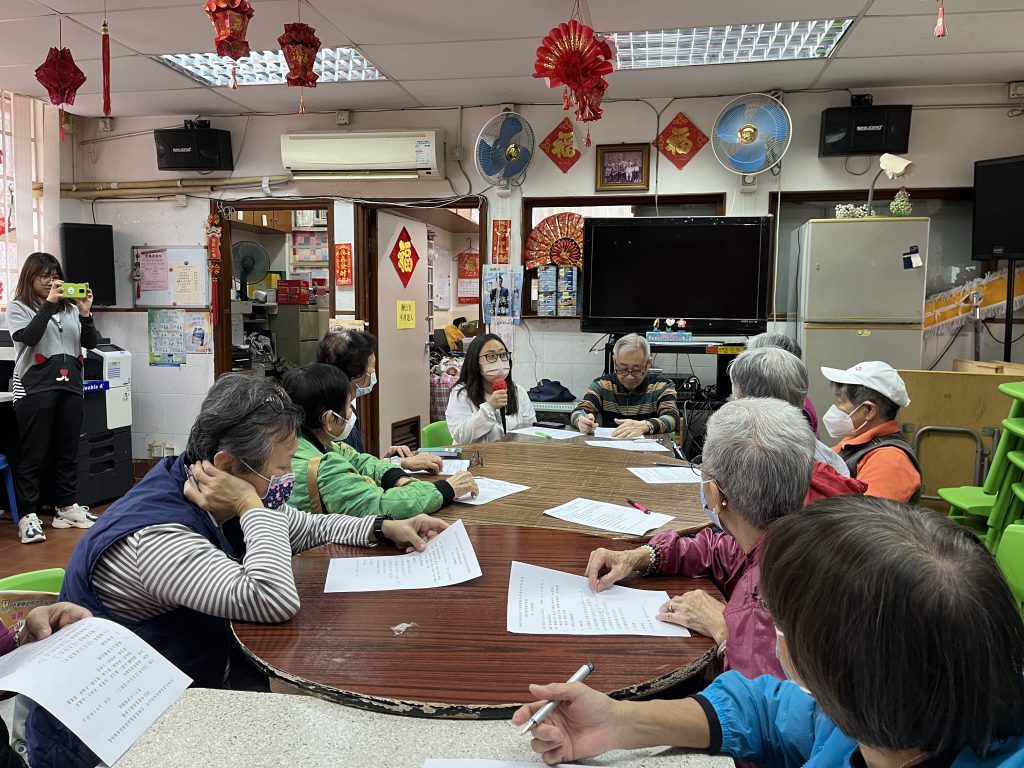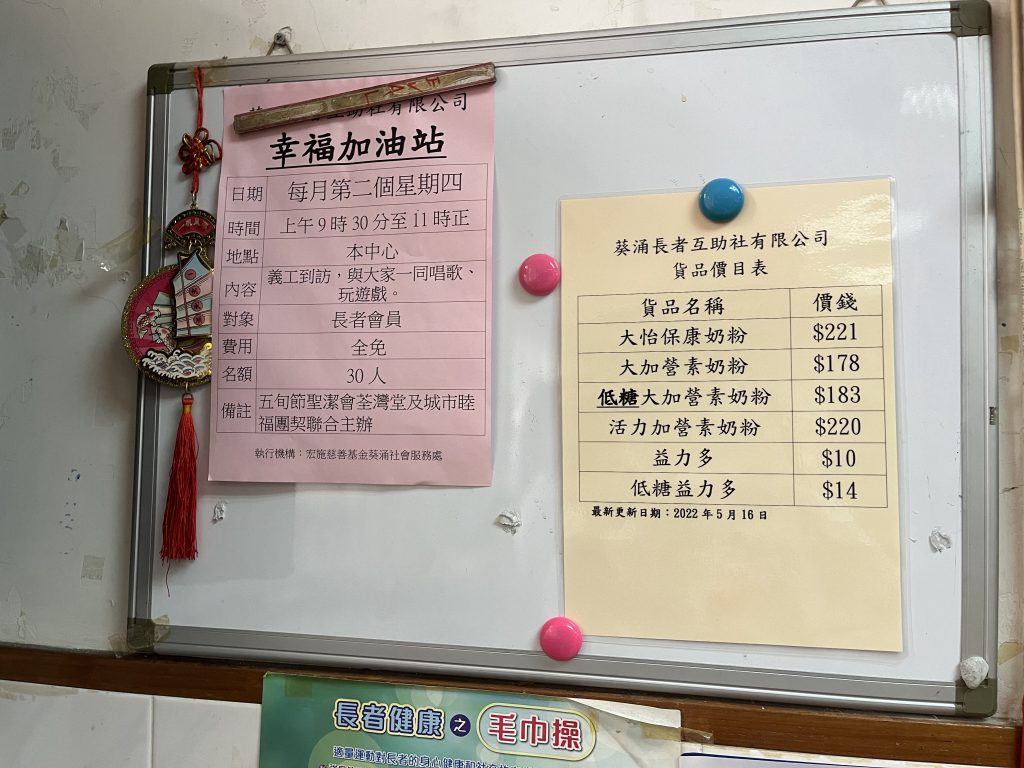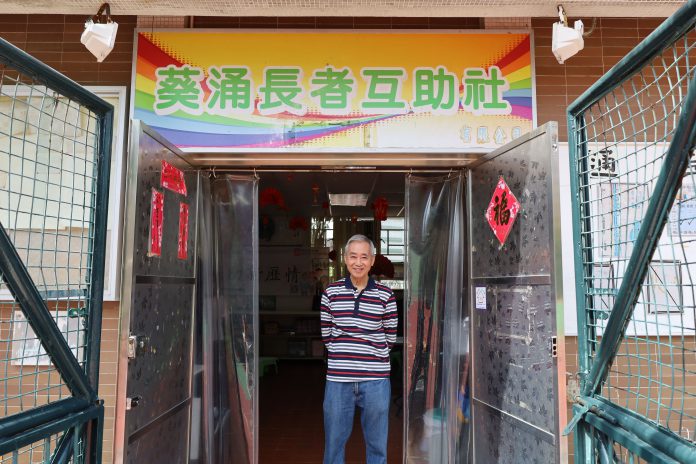An elderly-run NGO provides community services for the elderly to promote active ageing in Hong Kong.
By Sunnie Wu and Nicole Li
While most elderly join activities as participants, Luk Po-kam has volunteered to host events as a committee member of an NGO for others for five years.
Luk goes to Kwai Chung Elderly Mutual Help Centre, which is fully operated by elderly, at 8 am when she is on duty.
“I am responsible for the cleaning, membership renewal and selling milk powder,” the 78-year-old retired cleaner says.
With an annual membership fee of HK$30 (US$3.85), members can enjoy services such as checking blood pressure, cholesterol level and weight, buying milk powder and joining interest classes.
“The centre hosts some activities like balloon classes. I’m in charge of writing down participants’ names when they apply to join events,” she says.

Founded by elderly and has been providing elderly service since 2000, Luk and other committee members have monthly meetings to discuss matters related to operational matters of the centre.
Meetings usually start at 9:30 a.m. and end within 30 minutes. All members stay focused and take notes about their discussion.
Kwan Shui-lun, the 80-year-old current director of the centre, says their committee members are used to this working model.
“Our meetings do not last long. Our work is efficient because we have established routines for our daily tasks. Our committee members are in a good position to handle this. We just need to tell them plans for the coming months,” he says.

He adds that everything is designed to be elderly-centred.
“Only the elderly can truly understand the needs of other elderly people. We host activities and provide services based on their interests and needs,” he says.
Kwan cites selling four kinds of milk powder at the centre as an example. “Those who have diabetes can buy low-sugar milk powder from us,” he says.
“It is more convenient and cheaper to buy milk powder at the centre, and our products have a longer expiry date,” he says.

The demanding workload and tasks do not stop Kwan from being devoted and passionate about serving the community. He has been volunteering in this centre for over ten years.
“What is more important is that every elderly who comes here is happy as they can gather and get what they need. We try our best to help them,” he says.
“I don’t feel tired as long as I can lend a helping hand to the elderly in need,” he says.
But Kwan admits that it is difficult to recruit new committee members.
“Some of our committee members have passed away, while others find the workload overwhelming,” he says.
Facing difficulties in operation, the Windshield Charitable Foundation helps assist with some administrative tasks, such as contacting and handling applications.
Chu Yuk-cho, a social worker from the foundation, serves as the center’s secretary.
“Elderly people may be weaker in calculating and typing documents, so we can help them with their paperwork,” he says.
“Our staff are not in the front lines. The most remarkable thing should be the services provided by the elderly volunteers. Everything will become meaningless if we lead,” he says.
Chu is surprised by the capability of the elderly volunteers. “From basic cleaning work to daily operation and duties, they can actually handle all tasks well,” he says.
“I especially appreciate the their efforts to learn how to use technology. For examples, they can text in our WhatsApp group without us promoting them,” he adds
Chu believes that the perception of the elderly as being relatively weaker is a stereotype.
“They are actually normal people. They are retired doesn’t mean they are incapable of working. What they can do is far from our imagination, they are more capable than we think,” he said.
Dr. Florence Fong Meng-soi, the Deputy Director of the Asia-Pacific Institute of Ageing Studies, points out active ageing benefits elderly in different aspects.
“The concept of active ageing has been promoted globally since 20 years ago. It is because active ageing can lead to better quality of life in old age and represents the optimal concept of successful ageing,” Fong says.
“Elderly can have a improved physical well-being and better social well-being, with a lower chance of having depression and stress,” she adds.
Apart from the benefits, Fong stresses the responsibility of promoting active ageing should be shared by everyone in Hong Kong.
“It is everyone’s responsibility to promote active ageing, from the government to individuals,” she says.
Sub-edited by Eve Qiao







































